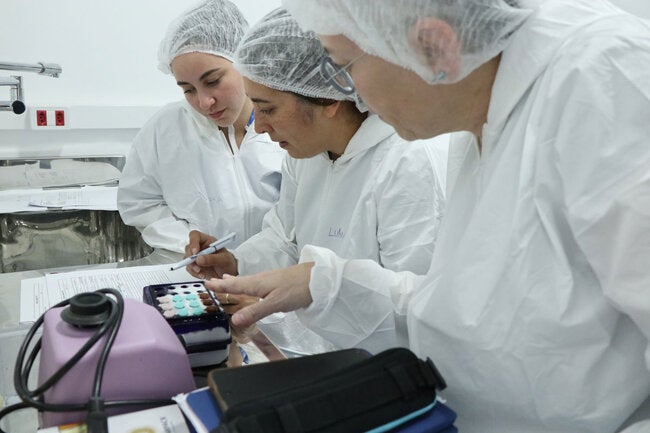Rio de Janeiro, August 22, 2025 (PANAFTOSA/SPV-PAHO/WHO) – Laboratory technicians from 19 Latin American and Caribbean countries completed a five-day workshop in Rio de Janeiro to enhance the detection of avian influenza A (H5N1), a virus responsible for over 4,700 reported outbreaks in birds and mammals and more than 70 human cases in the Americas since 2021.
Organized by the Pan American Health Organization (PAHO) through its Pan American Foot-and-Mouth Disease and Veterinary Public Health Center (PANAFTOSA), in collaboration with the International Atomic Energy Agency (IAEA) and its Joint FAO/IAEA Centre of Nuclear Techniques in Food and Agriculture, the workshop trained participants in advanced diagnostic techniques, including testing influenza in milk samples.
This expertise is critical given the zoonotic influenza outbreaks detected in dairy cattle in the United States since 2024. Participants reviewed international standards for accrediting diagnostic tests and were trained in biosafety protocols for the safe handling, shipping, and processing of samples.
“Strengthening our region’s laboratories is vital for early detection and control of avian influenza, safeguarding both animal and human health,” said Ottorino Cosivi, Director of PANAFTOSA. “This training equips countries to more effectively address an evolving threat,” he added.
Technicians from Argentina, Belize, Bolivia, Brazil, Chile, Colombia, Costa Rica, Cuba, Ecuador, El Salvador, Guatemala, Honduras, Mexico, Nicaragua, Panama, Paraguay, Dominican Republic, Uruguay, and Venezuela practiced molecular techniques such as real-time PCR (Polymerase Chain Reaction) to identify the virus and genetic sequencing tools to analyze its variants.
“Controlling zoonotic diseases demands a multisectoral approach. This collaboration exemplifies the importance of integrating animal and public health sectors in veterinary training to produce professionals capable of addressing health challenges affecting both animals and humans,” said Carla Bravo de Rueda, Animal Health Technical Officer at the IAEA.
The workshop was supported by the Federal Laboratory for Agricultural Defense in Campinas (Brazil), a World Organisation for Animal Health (WOAH) Reference Laboratory for avian influenza, and the Regional Office of the Food and Agriculture Organization of the United Nations (FAO) for Latin America and the Caribbean. It was also supported by the PROTECT project, funded by the Pandemic Fund, and the IAEA’s regional project RLA 5085.
A(H5N1) is a zoonotic virus transmissible from animals to humans, underscoring the need for coordinated surveillance in animal and human health under the One Health approach, which recognizes the interconnection of human, animal, and environmental health.
Since 2020, the A(H5N1) virus has spread across Africa, Asia, Europe, and the Americas, affecting wild and domestic birds, mammals, and over 1,000 dairy herds in 17 U.S. states as of May 2025. While there is no evidence of human-to-human transmission, PAHO and WHO urge sustained vigilance to monitor changes in the virus.
PAHO will continue providing technical support to countries in the region to bolster surveillance, response, and preparedness systems for emerging diseases, with the goal of protecting public health, food security, and animal welfare.
Note to Editors:
The workshop instructors included technical staff from PAHO, PANAFTOSA, the IAEA, and the Joint FAO/IAEA Centre of Nuclear Techniques in Food and Agriculture. Additionally, collaboration was provided by experts from regional and global institutions, including:
- Food and Agriculture Organization of the United Nations (FAO)
- National Animal Health Laboratory Network (NAHLN) of the United States
- Federal Laboratory for Agricultural Defense in São Paulo (LFDA-SP), WOAH Reference Laboratory for avian influenza and Newcastle disease
- Laboratory for Agricultural Defense in Minas Gerais (LFDA-MG)
- Embrapa Gado de Leite, a unit of Embrapa, Brazil’s public institution focused on dairy production research
- WHO Collaborating Centre for Studies on the Ecology of Influenza in Animals at St. Jude Children’s Research Hospital
- Duke-NUS Medical School Centre for Outbreak Preparedness (Singapore)
